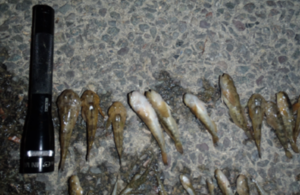Thames Water fined £2m for “foreseeable and avoidable” pollution
Oxfordshire water contamination "reckless failure" - judge

2015 pollution killed dozens of fish
Thames Water has been fined £2million after raw sewage polluted two Oxfordshire streams, killing almost 150 fish. The sewage also flooded a nearby garden.
Judge Peter Ross, at Oxford Crown Court on 21 December, ruled the incident in 2015 as a high-end, category three harm offence.
Numerous failures in the management of a sewage pumping station operated by the company led to sewage created by two villages emptying into two brooks leading to the River Evenlode, a tributary of the River Thames, for up to 24 hours.
Judge Ross found Thames Water were “reckless” in polluting Idbury and Littlestock brooks at Milton-under-Wychwood, near Chipping Norton, on 8 and 9 August 2015.
Environment Agency officers were quickly on site, discovering the entire local population of almost 150 bullhead fish had been killed by the toxic waste along a 50-metre stretch of water.
A member of the public reported dead fish in Idbury brook to the Environment Agency. A backlog of raw sewage was forced into the water from a sewer pipe that couldn’t hold it. Sewage also escaped from a manhole and onto a residential front garden.
The court heard Thames Water disregarded more than 800 high-priority alarms needing attention within four hours in the six weeks before the incident. Another 300 alarms were not properly investigated, all of which would have pointed out failures with the pumping station. One alarm was deliberately deactivated during a night shift.
Investigations by the Environment Agency revealed Thames Water was aware the pumping station failed several times in the 12 months up to and including the incident in August 2015.
Robert Davis, who led the investigation for the Environment Agency, said:
This incident was foreseeable and avoidable. Thames Water didn’t recognise the increased risk to the environment, ignoring or failing to respond adequately to more than 1,000 alarms.
These streams are normally a haven for kingfishers, grey herons, brown trout and other fish and invertebrates. Sewage poured into the water for 24 hours, having a terrible impact, killing fish and other water life.
We hope this prosecution sends a loud and clear message that the Environment Agency will not accept poor operation, management and maintenance of sewage pumping stations. Where we have evidence of offending and serious pollution incidents like here, we will take appropriate action to bring polluters to justice.
Judge Ross said Thames Water was ‘reckless’ by taking an unacceptable level of risk with the environment. It allowed the sewage pumping station to operate with no automatically available standby pump for around 10 months in the year prior to the pollution.
Environment Agency officers discovered other information and data highlighting repeated problems with the pumping station in the year before the pollution, which Thames Water failed to report to the Environment Agency.
Judge Ross ordered Thames Water to pay full costs of £79,991.57. The company pleaded guilty at an earlier hearing to two charges of breaching environmental law.
N.B. In the days following the hearing in 2018, judge Ross reduced the £2m fine to £1.8m after directing Thames Water to pay the remaining £200,000 to three local charities, the Berkshire, Buckinghamshire and Oxfordshire Wildlife Trust, the Evenlode Catchment Partnership and the Wychwood Project.
Updates to this page
-
Judge Ross later reduced the £2m fine to £1.8m after directing Thames Water to pay the remaining £200,000 to three local charities, the Berkshire, Buckinghamshire and Oxfordshire Wildlife Trust, the Evenlode Catchment Partnership and the Wychwood Project.
-
The court later reduced the fine to £1.8m, after directing Thames Water to pay the other £200,000 to the Berkshire, Buckinghamshire and Oxfordshire Wildlife Trust, the Evenlode Catchment Partnership and the Wychwood Project.
-
First published.